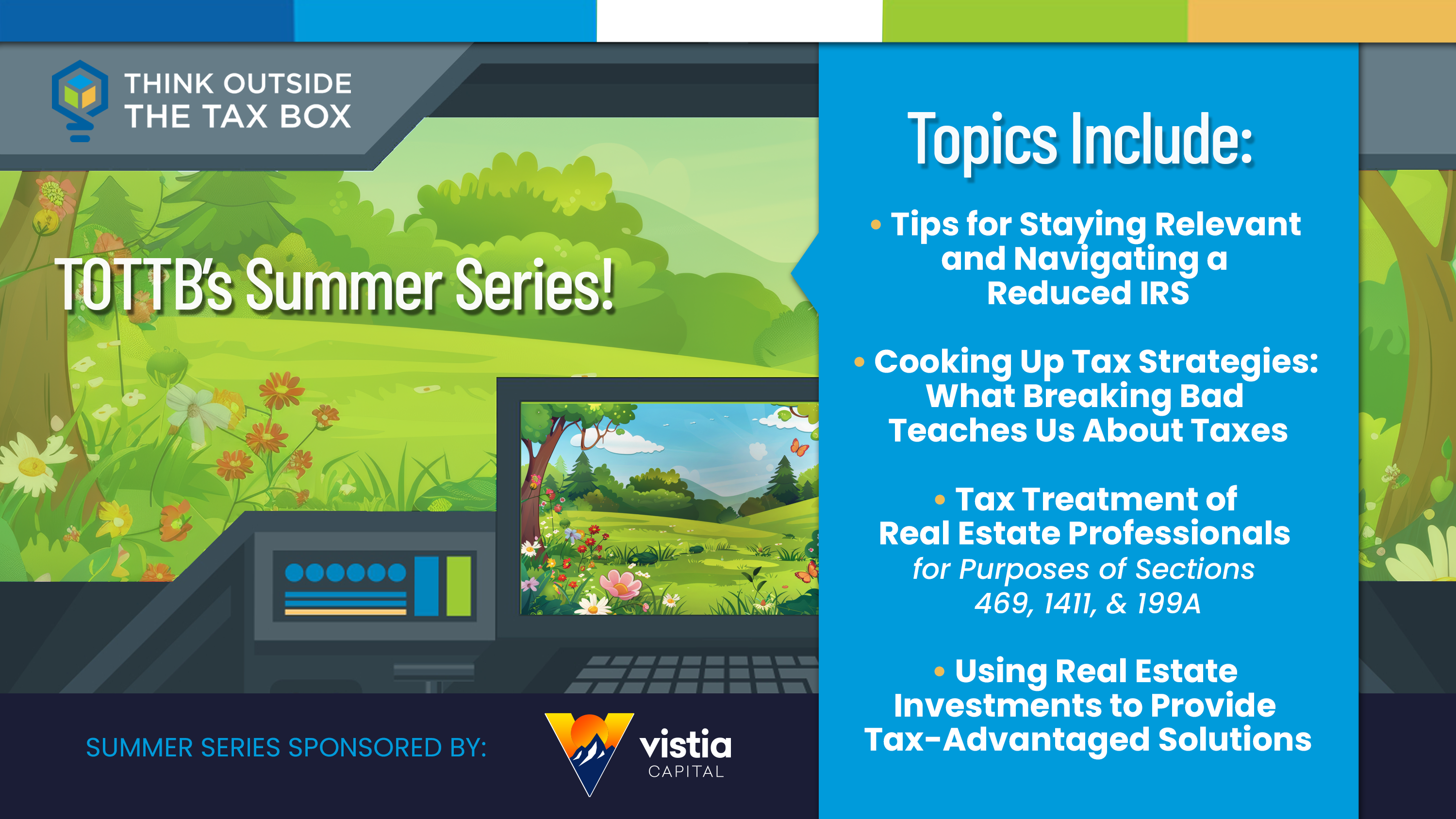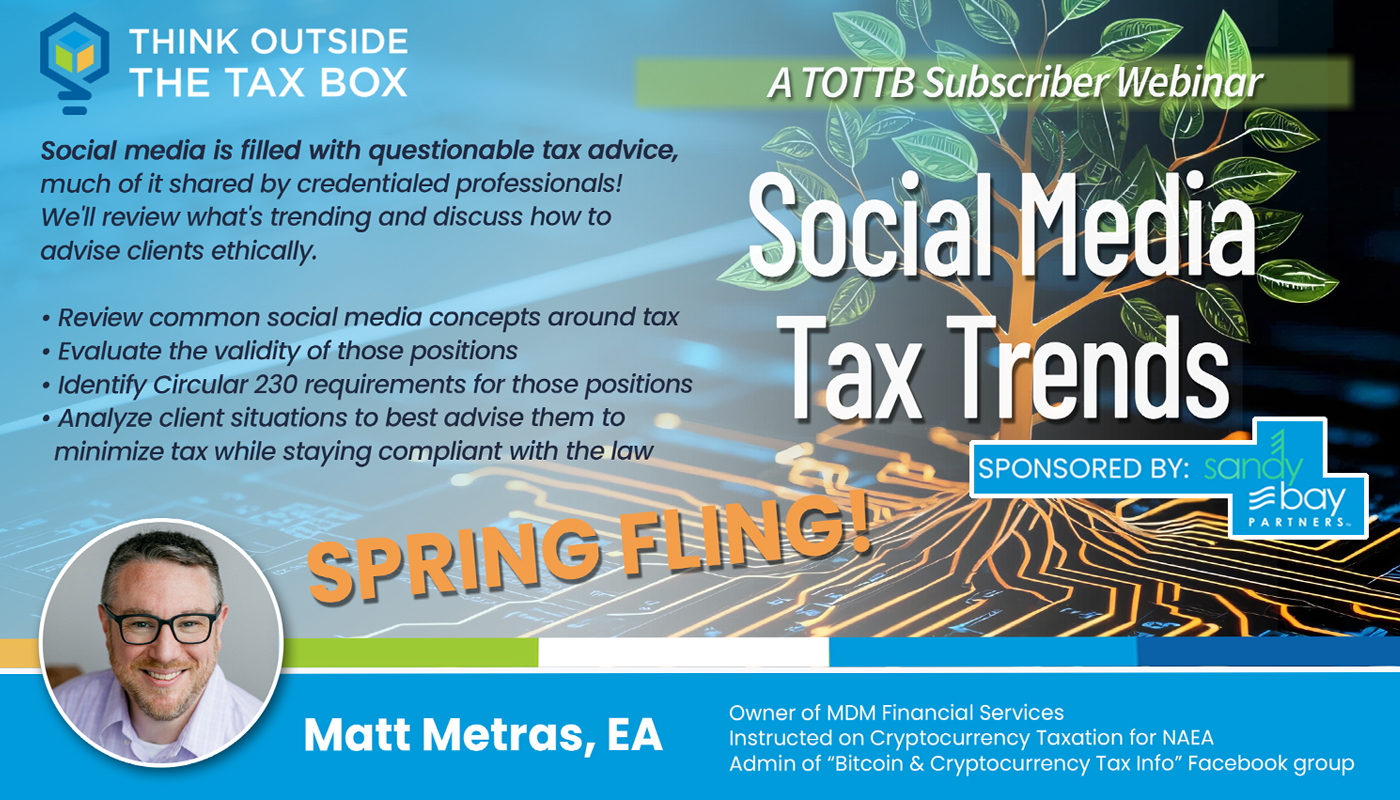CURRENT EDITION

OBBBA Rundown: Provisions Affecting Individuals for 2025
Enacted into law on July 4, 2025, the One Big Beautiful Bill Act is the biggest set of tax law changes since the 2017 Tax Cuts and Jobs Act (TCJA). The provisions discussed in this article impact individual taxpayers for tax year 2025 and must be considered immediately for proactive tax planning purposes, future tax withholding, and estimated tax payment calculations. Clients have questions, and we can generally give them the answers they seek; however, some will require future IRS guidance for complete clarity.
READ MOREFreelancer Deductions: What You Might Be Missing and What You Need to Remember
Even savvy freelancers often miss deductions that could significantly reduce tax liability. The IRS offers legitimate ways for freelancers to deduct business-related costs, but it’s not always obvious which expenses qualify and which ones cross the line into nondeductible territory. This confusion is made worse when we see some of the terrible advice from so-called “experts” on social media. In this article, we’ll explore the most commonly missed deductions for freelancers, highlight real-world examples, and review what tax professionals need to keep in mind when advising these clients.
Read MoreHow to Help Your Clients Maximize College Financial Aid
College tuition continues to climb, and for many families, financial aid can make or break their ability to afford their child’s higher education dreams. What most don’t realize is that their tax return — filed long before students even begin applying for college — plays a major role in determining how much financial aid they’ll receive. This is where you come in. Tax professionals and financial planners are uniquely positioned to help clients qualify for more college financial aid. But only if you know what to look for.
Read MoreThe Rise of Post-Cognitive Tax Accounting: Embracing a New Frontier in 2027 (or Sooner!)
The year is 2027, and the landscape of tax accounting has undergone a dramatic transformation. Artificial Intelligence (AI) has automated many traditional tasks once considered the bedrock of the profession. Yet, contrary to fears of widespread job losses among tax preparers, this technological revolution has ushered in a new era – Post-Cognitive Tax Accounting. This paradigm shift is redefining the role of tax professionals, opening opportunities to explore uncharted territories that leverage human intuition, creativity, and strategic insight.
Read MoreTAX COURT ROUNDUP – May 2025
Once again, Tax Court provides slices of life as well as hyper-technical drilldowns into convoluted legal conundrums. To any who say that tax law is dull, I refer them to the annals of 400 Second Street, NW, where anything goes.
Read More2025 Summer Education Series Event Calendar
We are thrilled to bring you the 2025 Summer Education Series, sponsored by Vistia! All summer long we will be bringing our loyal subscribers monthly webinars featuring some of the brightest minds in tax. Each webinar will feature our usual blend of high-quality education and entertainment and include continuing education credits for those who qualify. All of this is included in your regular subscription! Continue reading to see what we have in store...
Read More2025 Spring Fling Webinar Event
As we prepared our 4th Annual Summer Education Series, our friends at Sandy Bay challenged us to go bigger and do even more live events than we originally planned. So, we did! We are proud to present Think Outside the Tax Box's first ever “Spring Fling” live webinar event. As a monthly or annual subscriber, this webinar is 100% exclusive, and free to you! Every webinar comes with free continuing education credits for those who qualify! Keep reading for more details...
Read MoreJust How “Hot” Should IRC Section 751 Be?
Tax rules are generally designed with a purpose in mind. Most rules serve to define the tax base and tax rates. Many others serve a behavioral purpose to encourage or discourage certain activities. The focus of this article stems from tax rules that are a combination of favoring certain activity such as generation of capital gains, and a limitation on such gains for certain taxpayers, such as the so-called “hot assets” rule for partners under IRC Section 751, Unrealized Receivables and Inventory Items. While Section 751 has been in the tax law for decades, a new application of it was raised by both the IRS and California FTB. This article summarizes Rawat, TC Memo 2023-14, rev’d, No. 23-1142 (DC Cir., 2024), and FTB Legal Ruling 2022-02, and offers observations on their relevance to tax research and practice.
Read More1099 K(ickstarter): Crowdfunding and Taxes
Astronomical expenses crop up more than ever in our economy. From medical bills, business startups, a long-cherished artistic project, it feels like things are harder to afford now than ever. But the internet has also helped create a revolutionary way to raise large amounts of money for some of these causes: crowdfunding. But what does that mean for when the Tax Man comes calling?
Read MoreNOT A MEMBER YET?

SUBSCRIBE TO GET ALL OF OUR
GREAT ARTICLES AND RESOURCES!
CURRENT EDITION

OBBBA Rundown: Provisions Affecting Individuals for 2025
Enacted into law on July 4, 2025, the One Big Beautiful Bill Act is the biggest set of tax law changes since the 2017 Tax Cuts and Jobs Act (TCJA). The provisions discussed in this article impact individual taxpayers for tax year 2025 and must be considered immediately for proactive tax planning purposes, future tax withholding, and estimated tax payment calculations. Clients have questions, and we can generally give them the answers they seek; however, some will require future IRS guidance for complete clarity.

OBBBA Rundown: Provisions Affecting Businesses for 2025
Enacted into law on July 4, 2025, the One Big Beautiful Bill Act is the biggest set of tax law changes since the 2017 Tax Cuts and Jobs Act (TCJA). The provisions discussed in this article impact business taxpayers for tax year 2025 and must be considered immediately for proactive tax planning purposes, future tax withholding, and estimated tax payment calculations. Clients have questions, and we can generally give them the answers they seek; however, some will require future IRS guidance for complete clarity.

Big, Beautiful, and Oh So Salty: SALT and the OBBBA
The SALT cap has been one of the most argued pieces of the One Big Beautiful Bill Act as it has been making its way toward passage. Actually, tax professionals and politicians have been talking about the SALT cap (and looking for ways around it) since it was enacted as part of the Tax Cuts and Jobs Act. As most of you are aware, most TCJA provisions were set to expire at the end of 2025, including the SALT cap. We take a look at where they stand now.









